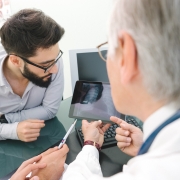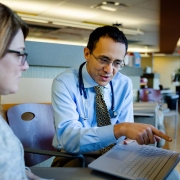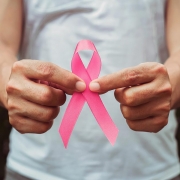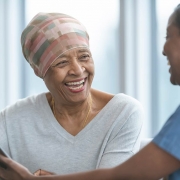Stomach and Esophageal Cancer Q&A
While cancers of the stomach and esophagus are rare, these cancers are usually advanced by the time they are detected. An expert medical oncologist sheds light on diagnosis, risk factors and treatment.
How are stomach and esophageal cancers diagnosed?
Patients diagnosed with esophageal cancer often start with concerns about difficulty or pain during swallowing, weight loss or a cough and hoarseness. Those diagnosed with stomach cancer often first notice a general discomfort in the stomach, loss of appetite, weight loss and vomiting. Screening generally includes an upper endoscopy, a procedure in which a thin scope with a light and camera is used to look inside the upper digestive tract.
Why do stomach and esophageal cancers occur?
Smoking, heavy alcohol consumption, and diets rich in fats and salt and lacking in fresh fruits and vegetables can lead to these cancers. Increasing age, gender (men are more likely to develop these cancers than women), obesity and lack of physical activity are also potential culprits.
Once diagnosed with stomach and esophageal cancer what are the treatment options?
Multimodality treatment (surgery, radiation and chemotherapy) is often used. Sequencing of treatment is determined by the stage, size and location of the tumor.
What types of surgeries are performed for stomach and esophageal cancer?
A process known as “endoscopic mucosal resection” removes the cancerous area through an endoscope. Subtotal gastrectomy, removal of part of the stomach, is used for cancer located in the upper part of the stomach. If the cancer has spread throughout the stomach, a total gastrectomy will remove the stomach and rework the digestive tract. For esophageal cancer, surgery may remove some or most of the esophagus through an esophagectomy.
How are radiation therapies used?
- Prior to surgery if the cancer is localized to the esophagus. Studies show the survival rate is improved when chemotherapy and radiation therapy are given together before surgery
- With stomach cancer and occasionally esophageal cancer, if patients undergo surgery without getting radiation or chemotherapy prior to surgery, it is sometimes advisable to give chemotherapy and radiation therapy after surgery to help clean up the cells that may have been left behind at the time of surgery.
- Radiation therapy can sometimes be used to control pain or bleeding from cancer. In this case a short course of radiation therapy is given, usually without chemotherapy, for local control of a tumor that is causing pain or bleeding even if patients have metastatic disease.
What is the best chemotherapy regimen for stomach and esophageal cancer?
Chemotherapy treatment options usually include between one and three drug combinations. The three-drug combination tends to induce the highest responses but also has the highest rates of side effects.
Why do some people have radiation therapy and chemotherapy while others just have chemotherapy?
Radiation therapy is used when cancer is localized to one area like the esophagus or stomach. When cancer spreads outside the local area to the liver or lungs it usually spreads through the blood. When this occurs, the cancer is no longer localized and other treatments are needed.
What are the benefits of adding chemotherapy to radiation therapy?
Adding chemotherapy to radiation therapy augments the effects of radiation therapy. Chemotherapy also helps control cancer cells that might be trying to escape into the blood. When given alone or in combination with radiation therapy, chemotherapy may help alleviate symptoms related to stomach cancer. In patients with more advanced stomach cancer in whom surgery is not possible, chemotherapy may also improve both the length and quality of life.













